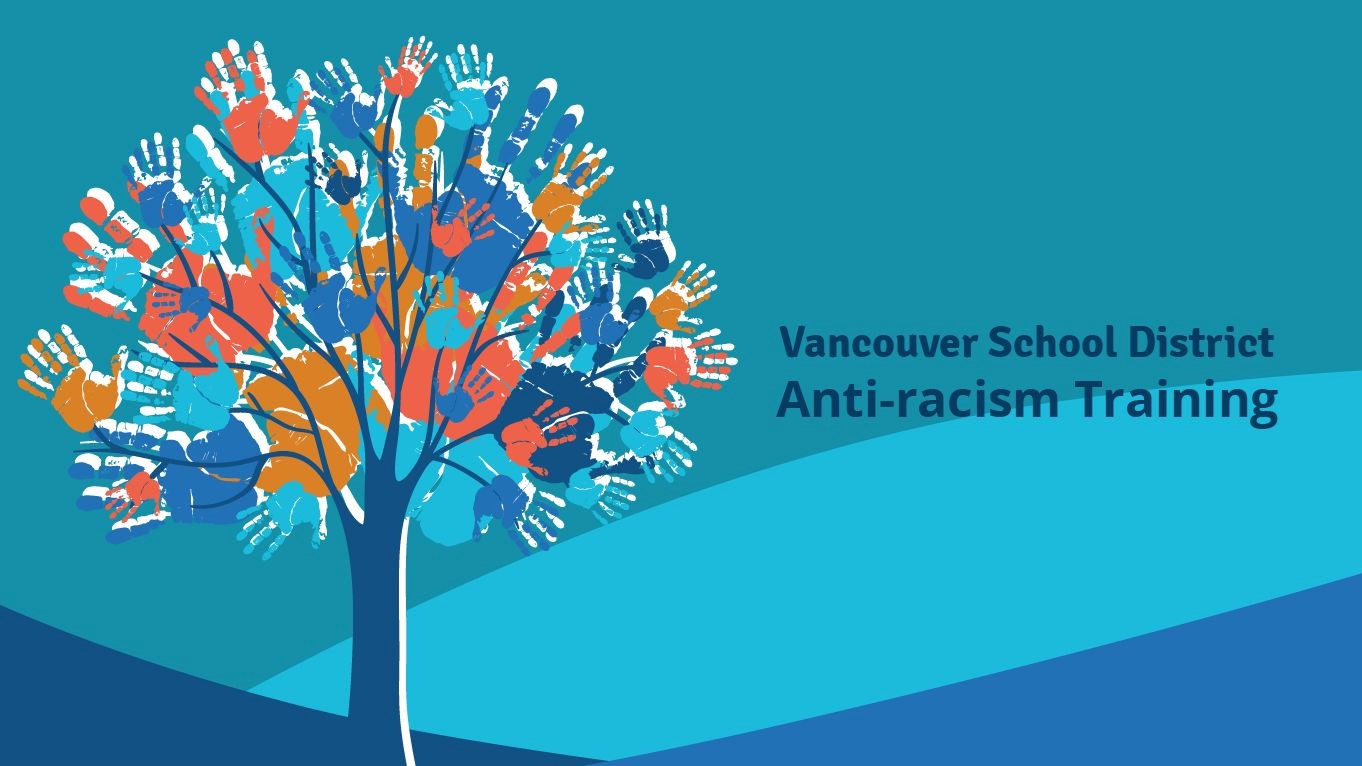District Staff Undertake Anti-Racism Training

As the new school year begins, teachers, school and student support assistants, counsellors, principals and vice-principles, staff in school offices, facilities and the Education Center all partook in anti-racism training.
Through three modules staff learned, unlearned and relearned important foundational items to addressing racism at the individual, community and systemic levels. Each module was led by engaging and informative keynote speakers who centered the learning with reflective questions, scenarios and power demonstrations of what racism is, its impacts and how together we can all further anti-racism and non-discrimination in the education system.
“These workshops have shed a new light on racism for me and I have gained a new perspective,” says Julia Giuriato, secondary school teacher on call.
Students opened the first module with a spoken word performance relaying how racism affects them. Which, as Lorelei Russell, human resources director says, “The opening with the student voices was very powerful!”
With this as grounding, the first module then proceeded with a welcome by Alec Dan, Musqueam Nation Community Member. He encouraged everyone to approach the training with an open mind and open heart, while also supporting one another through this journey of learning and growth. The module then featured two Grade 12 students, Kaialuna Scarpetta-Lee and Lara Al-Sammarraie (Albahadeli), from Vancouver Technical Secondary who shared their experiences with racism and suggested ways that the school system could be improved. They also spoke of their hopes for staff’s continued learning through the training. Following, Chief Robert Joseph, Ambassador for Reconciliation Canada and a member of the National Assembly of First Nations Elders Council, discussed the cultural genocide by the Canadian government including the residential schools system and its lasting and damaging impacts on Indigenous cultures and languages. Chief Joseph introduced the concept of ‘cultural humility’ for District staff.
Cultural humility, participants learned, is a practice of self-reflection about how one’s own background and expectations impact a situation and of openness to others determining the relevance of their own identities to any given situation. Educators who have cultural humility, relayed Chief Joseph, honour the community’s thinking process. He explained that cultural humility can be seen as the ability to maintain an interpersonal stance that is other-oriented in relation to aspects of cultural identity that are most important to the community.
With this understanding of cultural humility, participants then heard from several District Multicultural Liaison Workers (MCLW) who shared their stories and discussed how cultural humility is required by educators supporting students new to Canada and BC’s education system.
The second module in the District’s anti-racism training series, Creating an Anti-Racist Environment, was presented by Destine Lord, an anti-racist and inclusion consultant.
This impactful session began with establishing basic definitions of racism, anti-black racism and systemic racism to establish a foundation for a discussion about how and why the words people use – intentionally, ignorantly, erroneously or otherwise – matter. Through the presentation of scenarios, experiences and examples, Lord led participants through a series of reflective exercises unpacking the notions of intention and impact, unravelling implicit bias, micro-aggressions and trauma, before discussing how District staff can enter into allyship with marginalized communities and individuals. Lord left staff with recommendations for further learning including books and podcasts, to aid them in their anti-racism efforts and allyship journey.
"Thank you for organizing today's in service!" says Sarah Dash, school principal at Carnarvon Elementary. "The response from staff was very positive. Many found Destine Lord's presentation especially helpful."
The third module, Fundamentals of Anti-Oppression, was presented by Udokam Iroegbu of Cicely Blain Consulting. She took participants through several exercises to help synthesize the importance of anti-oppression and how intersectionality compounds trauma. Udokam also explored the oppression staircase and particular steps District staff can use to climb the ladder of equity instead. Participants then explored the concepts of equity and equality more deeply, including how equality can perpetuate negative power dynamics and privilege.
As one staff member remarked, this session was a “useful overview of intersectionality, ableism, and associating microaggressions. [It was an] insightful analysis of equality versus equity relating to environment.” Staff participants then considered unconscious biases and how to responsibly and ethically use privilege to further social justice.
The training sessions concluded with a gift of the Cherokee Morning Song, performed by Indigenous education enhancement teachers, Davita Marsden and Brandon Peters. The song was offered as a gift of medicine to training participants and to honour everyone’s participation in the District’s anti-racism training sessions.
"This was a wonderful in-service! Feedback from Van Tech staff has been really positive and inspiring," says Richard Edge, vice-principal, Vancouver Technical Secondary School.
In October 2020, the Vancouver School Board passed a motion mandating all District staff participate in anti-racism training. Since then, trustees and senior staff participated in training. Additionally, new staff took the training as part of their orientation to the District. September 7, 2021 was set aside for all other staff to complete the training ahead of students’ return to schools later in the week.
Key to the District’s anti-racism education and its commitment to safe, welcoming and inclusive schools, the training complements existing teaching resources in use throughout Vancouver schools. Included amongst the dozens of curriculum resources supporting anti-racism education are:
- Hogan's Alley in Vancouver
- 365 Days and Ways to Celebrate Remarkable Black Canadians
- Build LGBTQ2S+ BIPOC histories into classroom conversations and lessons
- Addressing Race and Trauma in the Classroom: A Resource for Educators
- Decolonizing Anti-racism
- How to be an Ally to Indigenous People
